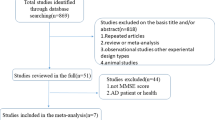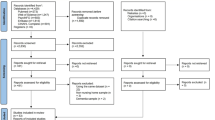Abstract
Objective
To determine the impact of diet quality interventions on neurocognitive decline in older adults.
Design
Four databases were searched (Medline, EMBASE, CENTRAL and PsycINFO) for randomised controlled trials involving diet quality interventions and cognitive outcomes in older adults. Study quality was assessed using the Cochrane Risk of Bias tool. Outcomes selected for meta-analysis were memory and executive function, for which standardised mean differences (SMD) were calculated. Subgroup and sensitivity analyses were undertaken to explore causes of heterogeneity. Additional outcomes of global cognitive function, incident dementia, attention, language/verbal fluency, and processing speed were narratively synthesised.
Results
Twelve studies were included, investigating the Mediterranean, Dietary Approaches to Stop Hypertension and Nordic diets. Risk of bias varied across studies. Dietary intervention had a significant effect on memory (SMD: 0.98; 95% CI: 0.39, 1.57; p = 0.001) and executive function (SMD: 2.02; 95% CI: 1.04, 3.01; p < 0.00001), although neither outcome was significant in sensitivity analyses. Heterogeneity was high (I2 = 99%) prior to sensitivity analyses and low (I2 = 0%) after. Results for narratively synthesised cognitive measures were inconsistent with no clear direction of effect.
Conclusion
The current body of evidence would suggest the effect of dietary intervention on neurocognitive decline in older adults is unclear given the considerable heterogeneity and bias present across studies. These findings should be interpreted with consideration to the limited number of studies that could be included and the large variation in study designs. Further randomised controlled trials with harmonised cognitive outcomes and assessments are needed to clarify direction of effect.
This is a preview of subscription content, access via your institution
Access options
Subscribe to this journal
Receive 12 print issues and online access
$259.00 per year
only $21.58 per issue
Buy this article
- Purchase on Springer Link
- Instant access to full article PDF
Prices may be subject to local taxes which are calculated during checkout



Similar content being viewed by others

References
Gauthier S, Reisberg B, Zaudig M, Petersen RC, Ritchie K, Broich K, et al. Mild cognitive impairment. Lancet 2006;367:1262–70.
World Health Organisation. World Report on Ageing and Health. Geneva: World Health Organisation; 2015.
World Health Organisation. Risk Reduction of Cognitive Decline and Dementia: WHO Guidelines. Geneva: World Health Organization; 2019.
Livingston G, Sommerlad A, Orgeta V, Costafreda SG, Huntley J, Ames D, et al. Dementia prevention, intervention, and care. Lancet 2017;390:2673–734.
World Health Orgainisation. The Top 10 Causes of Death [Internet] Geneva: World Health Organisation; 2018 [cited 2019 28th September]. Available from: https://www.who.int/en/news-room/fact-sheets/detail/the-top-10-causes-of-death.
Jacobs DR, Gross MD, Tapsell LC. Food synergy: an operational concept for understanding nutrition. Am J Clin Nutr. 2009;89:1543S–8S.
van den Brink AC, Brouwer-Brolsma EM, Berendsen AAM, van de Rest O. The Mediterranean, Dietary Approaches to Stop Hypertension (DASH), and Mediterranean-DASH Intervention for Neurodegenerative Delay (MIND) diets are associated with less cognitive decline and a lower risk of Alzheimer’s disease-a review. Adv Nutr. 2019;10:1040–65.
Dominguez LJ, Barbagallo M. Nutritional prevention of cognitive decline and dementia. Acta Biomed. 2018;89:276–90.
van de Rest O, Berendsen AA, Haveman-Nies A, de Groot LC. Dietary patterns, cognitive decline, and dementia: a systematic review. Adv Nutr. 2015;6:154–68.
Petersson SD, Philippou E. Mediterranean diet, cognitive function, and dementia: a systematic review of the evidence. Adv Nutr. 2016;7:889–904.
Wu L, Sun D. Adherence to Mediterranean diet and risk of developing cognitive disorders: an updated systematic review and meta-analysis of prospective cohort studies. Sci Rep. 2017;7:41317.
Chen X, Maguire B, Brodaty H, O’Leary F. Dietary patterns and cognitive health in older adults: a systematic review. J Alzheimers Dis. 2019;67:583–619.
Radd-Vagenas S, Duffy SL, Naismith SL, Brew BJ, Flood VM, Fiatarone Singh MA. Effect of the Mediterranean diet on cognition and brain morphology and function: a systematic review of randomized controlled trials. Am J Clin Nutr. 2018;107:389–404.
Moher D, Liberati A, Tetzlaff J, Altman DG. Preferred reporting items for systematic reviews and meta-analyses: the PRISMA statement. PLoS Med. 2009;6:e1000097.
Singh-Manoux A, Kivimaki M, Glymour MM, Elbaz A, Berr C, Ebmeier KP, et al. Timing of onset of cognitive decline: results from Whitehall II prospective cohort study. BMJ 2012;344:d7622.
Whiteley WN, Anand S, Bangdiwala SI, Bosch J, Canavan M, Chertkow H, et al. Are large simple trials for dementia prevention possible? Age Ageing. 2020;49:154–60.
Sterne JAC, Savovic J, Page MJ, Elbers RG, Blencowe NS, Boutron I, et al. RoB 2: a revised tool for assessing risk of bias in randomised trials. Bmj 2019;366:l4898.
The Cochrane Collaboration. Review Manager (RevMan) [Computer program]. 5.3 ed. Copenhagen: The Nordic Cochrane Centre; 2014.
Borenstein M, Hedges LV, Higgins JPT, Rothstein HR. Fixed-Effect Versus Random-Effects Models. In: Borenstein M, Hedges LV, Higgins JPT, Rothstein HR (eds). Introduction to Meta-Analysis. Wiley Online Library, 2009. pp77–86.
Wallace BC, Dahabreh IJ, Trikalinos TA, Lau J, Trow P, Schmid CH. Closing the gap between methodologists and end-users: R as a computational back-end. J Stat Softw. 2012;49:1–15.
Martínez-Lapiscina EH, Clavero P, Toledo E, Estruch R, Salas-Salvadó J, San Julián B, et al. Mediterranean diet improves cognition: the PREDIMED-NAVARRA randomised trial. J Neurol Neurosurg Psychiatry. 2013;84:1318–25.
Martinez-Lapiscina EH, Clavero P, Toledo E, San Julian B, Sanchez-Tainta A, Corella D, et al. Virgin olive oil supplementation and long-term cognition: the PREDIMED-NAVARRA randomized trial. J Nutr Health Aging. 2013;17:544–52.
Valls-Pedret C, Sala-Vila A, Serra-Mir M, Corella D, de la Torre R, Martinez-Gonzalez MA, et al. Mediterranean diet and age-related cognitive decline: a randomized clinical trial. JAMA Intern Med. 2015;175:1094–103.
Knight A, Bryan J, Wilson C, Hodgson JM, Davis CR, Murphy KJ. The mediterranean diet and cognitive function among healthy older adults in a 6-month randomised controlled trial: the MedLey study. Nutrients. 2016;8:579.
Wade AT, Davis CR, Dyer KA, Hodgson JM, Woodman RJ, Keage HAD, et al. A Mediterranean diet supplemented with dairy foods improves mood and processing speed in an Australian sample: results from the MedDairy randomized controlled trial. Nutr Neurosci.2020;23:646–658.
Wade AT, Davis CR, Dyer KA, Hodgson JM, Woodman RJ, Keage HAD, et al. A Mediterranean diet with fresh, lean pork improves processing speed and mood: cognitive findings from the MedPork randomised controlled trial. Nutrients 2019;11:04.
Blumenthal JA, Smith PJ, Mabe S, Hinderliter A, Welsh-Bohmer K, Browndyke JN. et al. Longer Term Effects of Diet and Exercise on Neurocognition: 1-Year Follow-up of the ENLIGHTEN Trial. J Am Geriatr Soc. 2020;68:559–568.
Smith PJ, Blumenthal JA, Babyak MA, Craighead L, Welsh-Bohmer KA, Browndyke JN, et al. Effects of the dietary approaches to stop hypertension diet, exercise, and caloric restriction on neurocognition in overweight adults with high blood pressure. Hypertension 2010;55:1331–8.
Li M, Liu L, Song S, Shi A, Ma Y, Zhang S, et al. Effect of long-term lifestyle intervention on mild cognitive impairment in hypertensive occupational population in China. Med (Baltim). 2018;97:e11975.
Nilsson A, Tovar J, Johansson M, Radeborg K, Björck I. A diet based on multiple functional concepts improves cognitive performance in healthy subjects. Nutr Metab (Lond). 2013;10:49.
Ngandu T, Lehtisalo J, Solomon A, Levalahti E, Ahtiluoto S, Antikainen R, et al. A 2 year multidomain intervention of diet, exercise, cognitive training, and vascular risk monitoring versus control to prevent cognitive decline in at-risk elderly people (FINGER): a randomised controlled trial. Lancet 2015;385:2255–63.
Marseglia A, Xu W, Fratiglioni L, Fabbri C, Berendsen AAM, Bialecka-Debek A, et al. Effect of the NU-AGE diet on cognitive functioning in older adults: a randomized controlled trial. Front Physiol. 2018;9:349.
Tsoi KKF, Chan JYC, Hirai HW, Wong A, Mok VCT, Lam LCW, et al. Recall tests are effective to detect mild cognitive impairment: a systematic review and meta-analysis of 108 diagnostic studies. J Am Med Dir Assoc. 2017;18:807.e17–e29.
Yu J, Li J, Huang X. The Beijing version of the Montreal Cognitive Assessment as a brief screening tool for mild cognitive impairment: a community-based study. BMC Psychiatry. 2012;12:156.
Gallaway PJ, Miyake H, Buchowski MS, Shimada M, Yoshitake Y, Kim AS, et al. Physical activity: a viable way to reduce the risks of mild cognitive impairment, Alzheimer’s disease, and vascular dementia in older adults. Brain Sci. 2017;7:22.
Jennings A, Cunnane SC, Minihane AM. Can nutrition support healthy cognitive ageing and reduce dementia risk? BMJ 2020;369:m2269.
Quigley A, MacKay-Lyons M, Eskes G. Effects of exercise on cognitive performance in older adults: a narrative review of the evidence, possible biological mechanisms, and recommendations for exercise prescription. J Aging Res. 2020;2020:1407896.
Wilson RS, Beckett LA, Barnes LL, Schneider JA, Bach J, Evans DA, et al. Individual differences in rates of change in cognitive abilities of older persons. Psychol Aging. 2002;17:179–93.
Smith PJ. Pathways of prevention: a scoping review of dietary and exercise interventions for neurocognition. Brain Plast. 2019;5:3–38.
Webster L, Groskreutz D, Grinbergs-Saull A, Howard R, O’Brien JT, Mountain G, et al. Core outcome measures for interventions to prevent or slow the progress of dementia for people living with mild to moderate dementia: Systematic review and consensus recommendations. PLoS One. 2017;12:e0179521.
Harrison JK, Noel-Storr AH, Demeyere N, Reynish EL, Quinn TJ. Outcomes measures in a decade of dementia and mild cognitive impairment trials. Alzheimers Res Ther. 2016;8:48.
Agarwal A, Ioannidis JPA. PREDIMED trial of Mediterranean diet: retracted, republished, still trusted? BMJ 2019;364:l341.
Author information
Authors and Affiliations
Contributions
All authors have given final approval of the version to be published. LMcB contributed substantially to data collection, processing and interpretation; writing the first draft of the manuscript and revising it critically; SO’R: Substantial contribution to conception and design, processing and interpretation of data; writing the article and revising it critically for important intellectual content. SO’R is the guarantor for the work and the conduction of the study, including the decision to publish the work.
Corresponding author
Ethics declarations
Competing interests
The authors declare no competing interests.
Additional information
Publisher’s note Springer Nature remains neutral with regard to jurisdictional claims in published maps and institutional affiliations.
Supplementary information
Rights and permissions
About this article
Cite this article
McBean, L., O’Reilly, S. Diet quality interventions to prevent neurocognitive decline: a systematic review and meta-analysis. Eur J Clin Nutr 76, 1060–1072 (2022). https://doi.org/10.1038/s41430-021-01032-y
Received:
Revised:
Accepted:
Published:
Issue Date:
DOI: https://doi.org/10.1038/s41430-021-01032-y


